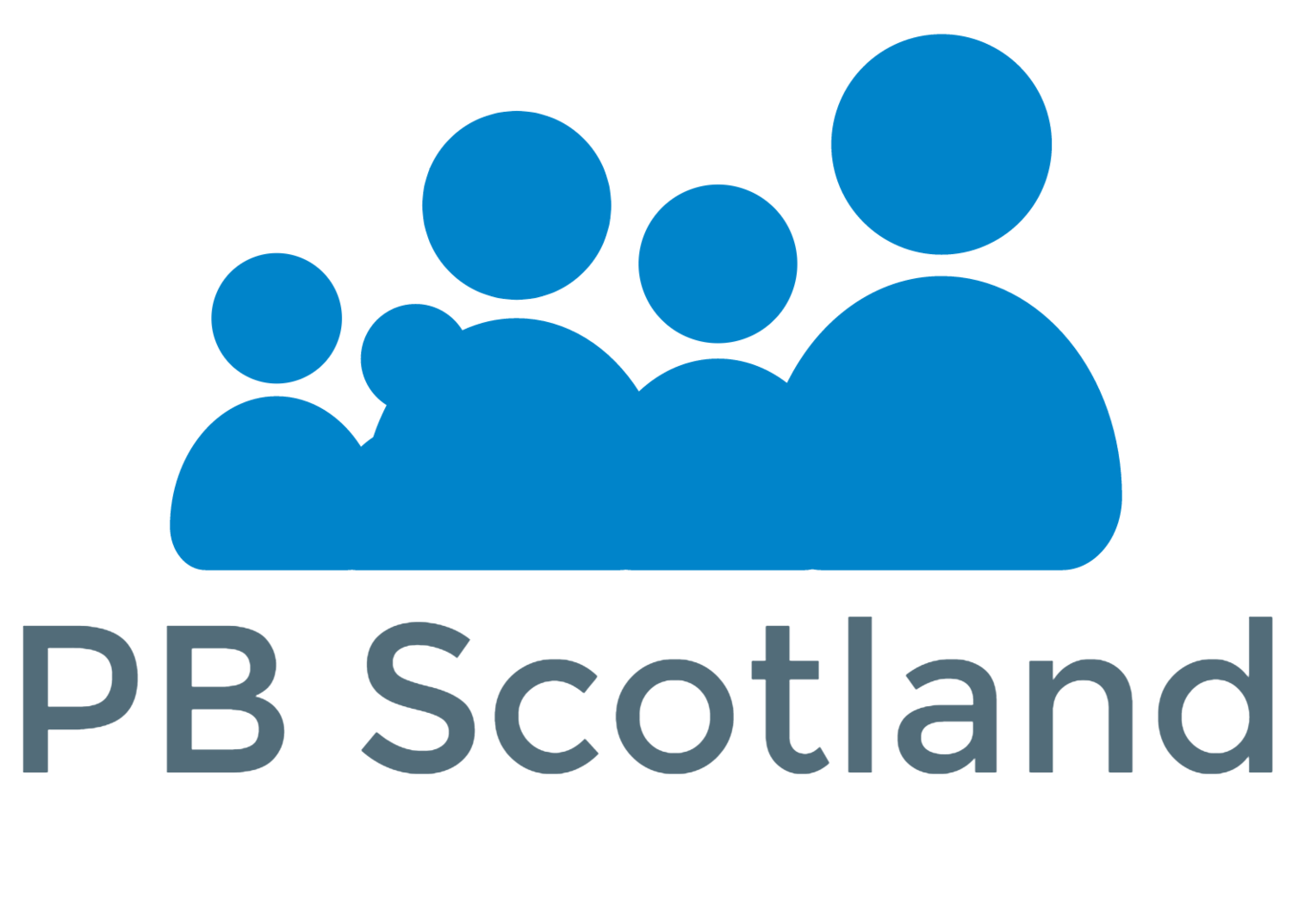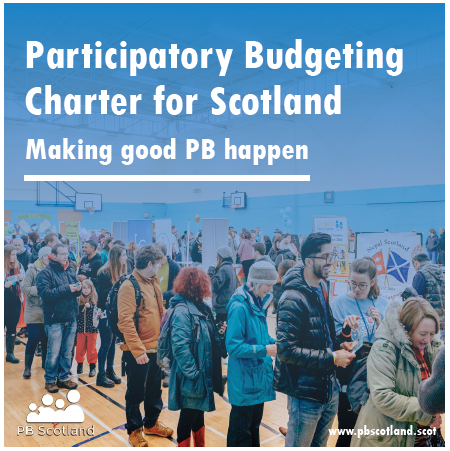Event report: PB In a Digital World
/More than 40 people from a variety of organisations in the public, voluntary, education and private sector attended our PB in a Digital World online workshop held on 25th August 2020.
Impact of PB so far
Opening the day, Paul Nelis emphasised that PB is about shifting the balance of power towards citizens, helping to create a Scotland that is fairer and more prosperous. He explained that the current pandemic has put a lot of things on hold, but now we need to consider how we can involve our communities in the discussions about ‘Building Back Better’. We will get back to face-to-face events but for now we need to consider digital approaches to engage our communities.
Over the last 4 years The Scottish Government has committed £7m (investment and support) to participatory budgeting and enabled over 122,000 voters to have a direct say in the dispersal of £6.6m at local events from the Borders to Orkney and funding local priorities from reducing the cost of a school day, funding the local U14 football team, upgrading the changing facilities at the local rugby club so that girls and young women can join in, buying a boiler for the community centre, supporting the development of grassroots mental health services to funding initiatives to improve the lives of homeless people. Other funder of PB in Scotland include health and social care being, wind farms, charitable trusts.
While the impact of PB has been largely positive there is always more work to be done to increase the engagement of communities, Glasgow Caledonian University’s research called for greater involvement and more resources put in to capacity building to give the community the skills and knowledge to participate more fully. Glasgow Disability Alliance (GDA) called for more inclusion of equality groups. And lastly, What Works Scotland called for more opportunity for meaningful dialogue. It is great that people can come along and cast a vote but if there was more dialogue then people who come along can discuss priorities in the community and perhaps change or amend their views based on positive dialogue.
Workshops
Paul explained that the purpose of the workshops were for participants to establish: What knowledge, skills, processes and tools do we need to develop an online PB process? Participants had the opportunity to participate in all 3 workshops.
Workshop 1 Digital Democracy with Gavin Crosby - Local Partnership Development Manager – Young Scot
Young Scot have delivered online voting for young people since 2011, and for Participatory Budgeting in the last 5 years, meaning young people from across the country have been able to quickly and easily take part in democratic processes. Over this time they have learnt lessons about encouraging young people to take part, working with a variety of partners, the balance between secure systems and an easy process, and some of the pros and cons of online voting.
Discussion - The workshop discussed what Young Scot have learned by engaging young people in decision making processes and participatory budgeting specifically. When given that opportunity they engage in large numbers. Gavin noted that young people are keen to take part in large numbers and in some cases well over half of the school population are involved. They make rational, democratic, caring, focused, forward looking sustainable choices.
Gavin discussed the challenges and balances that need to be considered:
The system needs to be quick and with easy registration but also need to check eligibility to participate.
There needs to be an appropriate level of security for the decision being made - this is really important that we don't put all the security on to a system that is for giving out £50 here and there.
We need to think about digital divide and whether everyone has access and have the skills to use it.
Online spaces are often open 24/7. We need to manage negative or bullying comments.
Being aware that some larger projects may have more supporters and therefore have ability to shout out louder than smaller projects. So how do we manage that?
The workshop focused on online discussions and what that means and how that might look, engaging people at a much earlier stage in the process and that a future PB system can and should cope with that, for people to have friendly open discussion. If we don’t do this it will happen anyway on Facebook and it can descend into a negative experience and a danger of excluding certain communities as people will speak to their friends rather than involving the whole community. Technology around having dialogue exists but implementing that in a safe way is more challenging.
Accessibility and democracy. We need to consider disabled children and young people who live in disadvantaged areas or homes that don't have as much access to technology.
PB planners & organisations should consider including things like audio film clips with subtitles and BSL. We need to get better at considering young deaf people and those with learning difficulties to make content clear, understandable and easy to read.
Key point - we don't need to hold online tools to higher standards than those used offline. We must be careful opening it out but don't want to think that any new online solution has to be perfect before we start.
Workshop 2 Our Digital journey with Elidh Brown - Partnership Development Lead - tsiMORAY
In this workshop, Eilidh discussed the digital journey through the ‘You Choose 4’ PB process, from launch through to lock-down, and now, as TSi Moray and partners dare to dream, look forward to the event series: ‘You Choose 4’ - Hopes for the Future.
The workshop focused on what the partnership have learned through ‘You Choose 4’ and the fast adaption to digital approaches through the global pandemic. In terms of the using their digital platform, Elidh found it straightforward. tsiMoray uploaded project descriptions and images online and people could register to vote on their website. tsiMoray used outreach to encouraged people to vote online.
tsiMoray are currently working with the projects that received funding in the last round and reconnecting with them online and learning from them about how they have taken things forward differently. However groups told tsiMoray that they are concerned about how to take forward their activities as no one size fits all. We need to be prepared for some communities embracing digital tools, but we need to be aware that some people are not engaging with online tools and consider how we can best support them.
Discussion - The overarching discussions in this workshop were about accessibility and inclusive processes.
There is not one tool or way of doing things that works for everyone and there has to be continued openness to understand that people have different needs and challenges to overcome. We need accessible resources and we need to continue working with people to meet individual needs. We also need to properly resource things, work with partners and be able to say what is it we need this time.
Supporting people with disabilities to take part is a concern to ‘You Choose’. They work with North East Sensory Services (NESS) which has been advising the organisation on how to deal with the challenges people face particularly when someone has more than one impairment. People with disabilities are finding it challenging to keep connected with their community and they are currently using the post and telephone to stay connected. We have to ask people what is going to work for them, and it may come down to individual solutions for individual people.
Going forward ‘You Choose’ want to do in person things but they are reassured that doing things online can also be meaningful. tsiMoray will never go back to just ‘in person’ as digital platforms provides opportunities for people who may not want to attend a busy hall to vote.
It's important to get in early and engage with people and give them time. PB processes could produce visual cards of the projects that can be taken away to be considered, filled in and given the results back at a later date.
Workshop 3 A Digitally Agile Response to Covid 19 with Pam Crosthwaite - Capacity and Empowerment Officer, North Ayrshire Council
Pam’s input described North Ayrshire moved from one ‘style’ of event (in person) to another (digital), to respond to the Covid-19 restrictions and how the process was delivered in the new circumstances. The ‘Substance of our Communities Participatory Budgeting Event’ brought together North Ayrshire Alcohol and Drugs Partnership to invited community groups and projects to submit bids for funding grants of between £8k and £10k (from a pot of £60k) to promote recovery and address the impact of drugs-related deaths in North Ayrshire’s communities.
North Ayrshire Council used CONSUL Software for voting which supported local people to vote for their top 3 projects.
Discussion - The group discussed concerns around security with CONSUL e.g. GDPR guidance and how are people’s private details protected, how do we gather information and where does it go? There were concern around using digital approaches alone as this will not suit everyone.
Discussion about PB tools available to the voluntary sector online to widen engagement. How do you access secure digital processes for communities?
Concern that more resources needs within the Comm/Vol sector for capacity building to work with councils and Health & Social Care Partnerships. We need to make sure that we are abiding by the PB charter and including the Comm/Vol sector as an equal partner in PB. It's about that equality and looking at our language and making sure that not only do local authorities get support but other sectors have that access.
The group discussed North Ayrshire Council pragmatic approach to using CONSUL, 616 people voted during the pandemic, which may be considered a small number but it is better than a small number of elected members in a room. The digital approach helped the authority to get money out quickly during the Covid-19 crisis so people could start to develop projects.
Key point - We can argue and debate if we are reaching the right people but each time you do PB you can get better and find new ways to engage with groups facing challenges.
Feedback from the session
Yes, really really helpful. Excellent presentations! I will take away and implement learning.
Very useful to get feedback on what has been happening during lock-down and how digital tools have been used. An honest and open discussion.
I found it very useful, probably the most useful is tapping into people's experience. Have taken down a few names so hopefully will be able to connect to ask specific questions about use of CONSUL and processes.
I found it very helpful mainly about ensuring inclusively. We thought we were doing OK but have along way to go.





